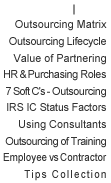
 |
|||
– also listen to Think180 podcast Managing Contractors Vs Employees
|
|
Area
|
Employee
|
Contractor
|
| Compensation | Established by manager & company | Established by vendor |
| Work Definition | By job description | By contract |
| Work Measurement |
By achievement of objectives for review period, and team contribution |
By milestones or service levels established in agreement or contract |
|
Terms & Conditions |
Set out in ongoing employment contract |
Set out in agreement or contract for specific work |
|
Benefits & Taxes |
Paid by company |
Paid by vendor |
|
Timeframe |
Permanent work, not time bound |
Engaged for period of time or phase |
|
Negotiation |
Around role, career, responsibilities, growth, salary |
Around deliverables, standards, timing, cost |
|
Authority |
By delegation |
Granted and authorized in writing |
|
Liability |
Company assumes |
Vendor carries |
| Direction |
Provided by manager as required |
Provided by client, per contract |
| Performance Review |
Performed periodically on role, includes behaviors & skills |
Performed upon delivery, against milestones or services levels |
| Learning/Training |
Is part of the job |
Expected to be proficient; learn at own cost (or vendor cost) |
| Commitment | To the company | To project or program |
|
Responsibility for Performance |
Manager shares responsibility for poor performance or failure. Company assumes liability |
Vendor responsible to deliver according to agreement. May be legally liable for failure |
| Bonus |
Manager has discretion |
Specified in contract with requisite conditions |
| Termination | In accordance with employment law and for acceptable reason(s) |
Subject to requirements of contract, and prevailing commitments |
Use this list to assist you in determining the level of management you will need to provide to a contractor or consultant before you bring them on to a project. Discuss with the vendor or contractor how you will manage them, then establish your role and style of working early in the relationship.
Your understanding of these differences will assist you in managing appropriately and delivering the results you are seeking.
© 2001 Endeavour Business Learning, 2009 Think180™
Note: To download a PDF copy of this article, go to the Think180 PDF Library page.
